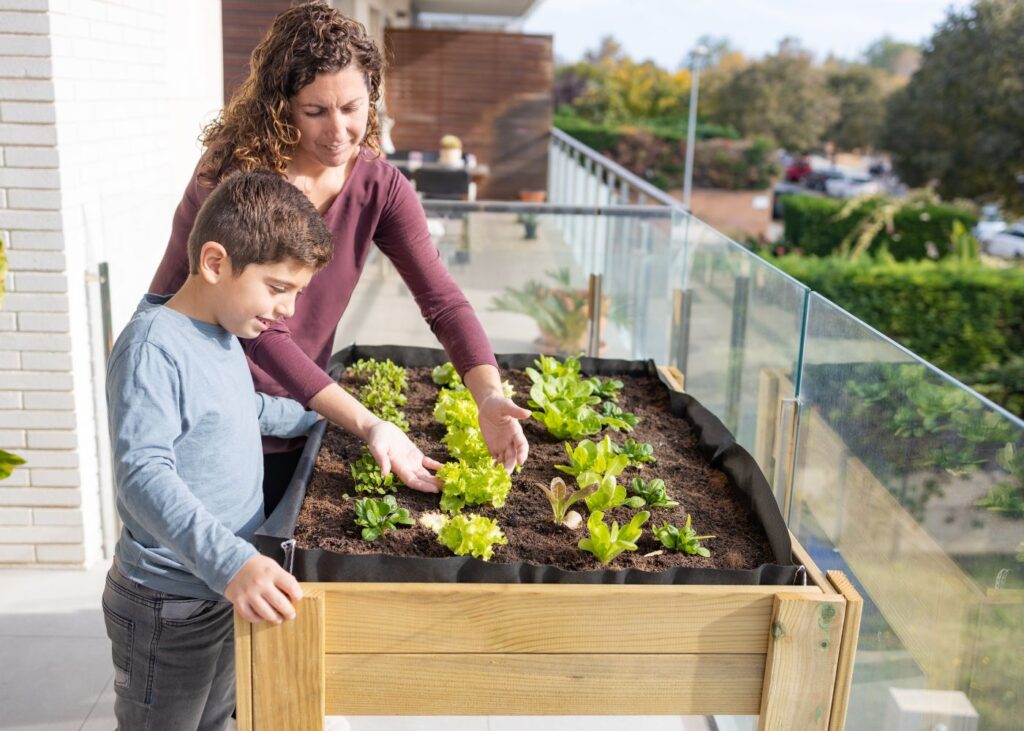4 Ways to Embrace a Self-Sufficient Lifestyle (Even in the Suburbs!)
If you run a business from home, you know the balancing act: managing clients, juggling kids, keeping the house running—all while trying to stay on top of the rising living costs. And let’s be real—have you seen the price of eggs lately?!
With the cost of living so high, many families are looking for ways to cut expenses and regain some control. Enter self-sufficiency—a lifestyle that’s not just for farmers or off-grid homesteaders but totally achievable, even in the suburbs.
Our grandparents lived in a time when self-sufficiency was the norm—milk was dropped to the doorstep, bread was baked fresh daily by the local baker down the road and families relied on local produce rather than supermarket shelves. Sounds like a good time right!
While modern convenience certainly has a role to play, finding a balance by being a little more self-sufficient will help your family cut costs, reduce the mental load of last-minute emergency grocery runs, and gives you confidence in knowing exactly what’s in your food and household products.
The best part? You don’t need acres of land, a chicken coop, or a wood-burning stove to start.
Becoming more self-sufficient is simply about finding small ways to rely less on big supermarkets and more on your own skills and resources. It’s about making manageable changes that fit into your busy life—whether that’s growing a few fresh ingredients, cutting down on grocery store trips, or enjoying the benefits of installing solar power for your home office.
Here’s how you can incorporate self-sufficiency into your daily routine—without adding extra stress to your already full plate.
1. Growing Your Own Food (Even When You’re Short on Time & Space)
If you’ve ever killed a houseplant or let a packet of fresh herbs turn into a sad, slimy mess in the fridge, don’t worry—this isn’t about suddenly becoming a master gardener.
Growing your own food is a great way to cut down on grocery costs and support a more sustainable lifestyle.
A packet of seeds costs less than a single bag of salad greens, and once your plants are growing, you’ll have a constant, free supply of fresh produce—no more last-minute dashes to the store for overpriced herbs or veggies!
It can be as simple as a few pots on your windowsill, a small veggie patch in the backyard, or even a couple of vertical planters on your balcony.
Even better? It’s a great way to get the kids involved—because let’s be honest, they’re way more likely to eat veggies they helped grow themselves!
Quick & Easy Starter Plants for Busy Mums:
- Herbs (Rosemary, Basil, Mint, Chives) – These require minimal maintenance, grow fast, and instantly upgrade home-cooked meals.
- Lettuce & Spinach – Cut what you need and watch it regrow. These veggies are perfect for quick and healthy lunches.
- Cherry Tomatoes – I never thought I’d see my 3-year-old munching on a cherry tomato until we started growing our own. These “set and forget” plants require minimal upkeep and are something the kids will love picking themselves.
Bonus: Gardening is an excellent stress reliever after a long day of work. It calms the mind, moves the body, and offers great quality time with your kids. Discover our creative tips on gardening with your little ones here.

2. Reducing Reliance on Supermarkets (and Making Meals More Affordable!)
We all know the feeling—running out of bread, yogurt, or snacks right when you have back-to-back Zoom calls and a house full of hungry kids.
Learning a few simple homemade swaps means fewer emergency supermarket trips. With the growing awareness of the health risks associated with processed foods and all the extra additives, it’s also a fantastic way to have more control over what’s in your food.
Bake Your Own Bread (No-Knead, No-Fuss!)
Don’t worry—this isn’t another pitch for sourdough. If you, like me, have killed more sourdough starters than you’d like to admit, you’ll be happy to know that baking bread can actually be simple, foolproof, and stress-free.
- Mix flour, yeast, salt, and water—let it rise, then bake.
- No fancy techniques, no mysterious bubbling starters—just fresh, homemade bread that’s healthy, delicious, and ready when you need it.
Bonus: Your house will smell amazing, and you’ll never have to do a last-minute grocery run for bread again.
Sunday Batch Cooking—Because Kids Are Snack Monsters
If your kids are constantly asking for snacks, batch cooking on a Sunday for the week can save your sanity (and your grocery bill). The trick? Make snacks that actually fill them up, so they’re not rummaging through the fridge every 10 minutes.
Smart Snack Ideas:
- Oat Flour Muffins – Packed with fibre and protein to keep them full longer. And so good to freeze!
- Homemade Muesli Bars – No weird additives, just oats, seeds, and a little honey.
- Banana & Peanut Butter Energy Bites – Quick, no-bake, and perfect for little hands.
Bonus tip: Invite your mum friends around on a Sunday afternoon and do a big bake together while the kids have a playdate!
Join or Community Start a Swap Group:
Many mums are trading homegrown produce, baked goods, or handmade products in local community groups. If you bake bread and a friend has backyard eggs, why not swap instead of shop?

3. Take Advantage of Installing Solar Power for Your Home Office (Because Who Has Time for Huge Power Bills?)
If you work from home, your electricity bill can skyrocket—computers, lights, chargers, and endless cups of coffee all add up.
Utilising solar power is one of the easiest and smartest ways to cut down on costs long-term while embracing self-sufficiency.
Here’s how it works: Solar panels absorb sunlight and convert it into electricity that power your home.
Since most of your energy use happens during the day (when the sun is shining), you’re using your own free electricity instead of paying for grid power. And if you pair your system with a solar battery, you can store excess energy to use at night—giving you complete energy independence and shielding you from rising electricity prices.
From a business perspective, solar is a smart financial investment. A quality solar system lasts 30+ years, meaning you’re not just cutting costs now—you’re securing decades of savings. The return on investment (ROI) is huge, with many systems paying for themselves within just a few years.
Read how this family of 4 became 98.71% energy self-sufficient after installing a solar and battery setup for their home.

4. Homemade and DIY Household Items (For a Healthier, Less Wasteful Home)
Between running a business and raising kids, the last thing you need is another trip to the store.
Making a few key household items yourself not only saves money but also means fewer chemicals and less waste in your home. Plus, you’ll never have to do the dreaded “late-night dash to the supermarket because we ran out of cleaning spray” again.
DIY Cleaning Spray (Safe for Kids & Pets!):
- 1 cup white vinegar + 1 cup water + 10 drops lemon essential oil
- This cleaning spray honestly replaces everything in your cupboard! Use on counters, sinks, and even glass—no harsh fumes, no unnecessary plastic bottles!
Beeswax Wraps (Say Goodbye to Plastic Wrap!):
- Melt beeswax onto cotton fabric squares, let cool, and use them as reusable food wraps.
- Perfect for covering snacks or wrapping sandwiches for the kids’ lunch.
Bonus: Involving kids in simple DIY projects like making wraps or mixing cleaning products teaches them sustainability while letting them have fun.

Find What Works for You to Create a More Independent and Self-Sufficient Lifestyle
You don’t have to overhaul your entire lifestyle to embrace self-sufficiency. Start with one change—baking your first loaf of bread, joining an online community to share ideas or installing solar power for your home office to cut down those pesky electricity bills.
Each step adds up, helping you save money, reduce waste, and create a more sustainable home—all while running your business and raising your family.
Want to take it a step further? Check out this article on creating a sustainable home office to make your workspace eco-friendly too!
Which self-sufficient swap are you excited to try first? Drop a comment—I’d love to hear!

Lucy Wood is a passionate work-from-home mum who juggles running a successful solar business and leading digital agency with raising her energetic young boys and playful border collie. After climbing the corporate ladder, becoming a mum shifted her focus to building a lifestyle that lets her be there for every family milestone while thriving in her own business. Lucy is passionate about helping other families embrace the freedom and flexibility of balancing business and family life on their terms.




